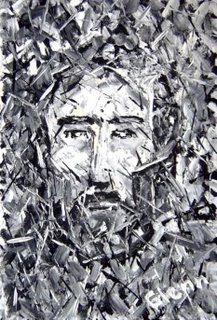Towards Maid-en Theology and Practice
by Glenn Plastina
As a pastor and theological educator, I find it very interesting in shaping and doing theological—above all, Christian—endeavor. I visited Hong Kong for the first time at the dawn of this century. It was a window that opened my eyes to the distinctiveness and uniqueness of Filipino ministries in this place (for most part of my life was spent in looking for an authentic Christian Filipino theology in my homeland). But now--it's just like I have to welcome my self to this long un-updated blog--so I have to keep up the pace.
In Hong Kong: Welcome to the world of women and workers!
Time and again, I wonder how my fellow people view God in this foreign land—one among many--as my fellow people were in diaspora globally. This scattering of Filipino Christians posts a challenge to doing theology as I personally perceived. In such a highly advanced community—technologically and economically superior—and often impersonal place, our fellows struggled to keep life on the move here in HK. Our nation, Philippines, flattered these women as “modern heroes,” but it is actually in relation to monetary productivity. They bring hugh cash in the nation's storage bank (and the corrupt officials' pocket?). They might be branded as “heroes’ but they bear the stigma of being “helpers.” The two descriptions are obviously distant and paradigmatic.
Most of the people I knew here dwell between the tension of becoming and unbecoming. For others, it’s between blessings and burden. For those who were highly educated, they were domesticated; the professionals became plain—more often less than average—people. Many individuals felt useful, but many suffered being used up. Many were not able to escape as mere financial provider to the whims of erring husbands and wayward children (a common and obvious effect of absentee wife and mother) although others experience sustainable satisfaction. Whether many are married or in man-hunting-business, the fact is, the need for theological relevance that relates to them is in view. Moreover, a ministry that meets their manner of living is a significant concern.
Christian Filipino style of theologizing in a particular place like Hong Kong is a great challenge. It requires different methodologies and approaches, even new theological models, as the needs arise. In my specific effort in educating Filipino—or in actuality, Filipina—leaders, (as most of them are women. Where are the men?) I tried to utilize dialogical, interactive, and gender-sensitive approach in their theological formation. Considering that the leaders’ situation here are very heavy and numbered, monologue (as in the style of the “experts” and “specialists” may not work well in this specific situation. Bookish, library researched, peppered with heavy footnotes and what-ever notes there is in the world, seemed outlandish here. The sophisticated approaches that mostly produce scholars, rather than servant-leaders and seekers of the lost, might be a disadvantage also. Applicability is more preferable than abstractions.
If I’ll move on further, perspectival, rather than patriarchal convictions and theological chauvinism can deal with sensitive issues and debacles. Hence, as I work it out with others, I propose an endeavor towards a redemptive maid-en theology and practice.
Why redemptive? My acquaintance with the wider body of Christ in HK provides a macro-perspective to what I am saying here. There seems to be a strong—and sometimes prevailing—“peasant-mentality” among many believers. Being a maid/helper doesn’t sound good to a lot of believers. If possible, this was the last thing they want to be called. Of course, a great number came for this is something better than in their hometowns. It is need that pushed out their courage to come. But many also came to be something less than who they were. Teachers, principals, college degree holders, and the like, all were boiled to one: maids. Crucial necessities pushed them to the limits. Their sense of self-identity, valuation, and personal pride were constantly challenged. Where redemption does comes in? It arrives in the restoration of self-identity and valuation of spirit in the light of God’s continuing salvific plan.
A relevant theologizing must cultivate their true value as humans created in the image of God. The sacredness and competency of the redeemed individual in the community of God must be stressed. Doing away with peasant-mentality is possible through the theological deformation-to-transformation. The root causes, internal problems (like the evil of insecurities, low self-esteem, and the like) must be deconstructed. In effect, the need of a transformative theological formation is a must to bridge them from being helpers to leaders, mere workers to winners (in terms of spiritual productivity), and maids to ministers. Authentic servant-hood (serving God while supporting their families) is a goal worth taking.
Why maid-en? I suppose that this theological endeavor is still in its primary stage (sounds like a maiden voyage, still going to the deep). I thank God for there are existing efforts that promote this theological formation through formal, non-formal, and some are in correspondent shapes. Presently, I’m privileged in joining this (from July-August 2006) pilgrimage towards transforming Christian leaders through Theological Education for Filipino Leaders, sponsored by Hong Kong Baptist Theological Education. PBTS is also an accrediting partner in this ministry.
These leaders are more than helpers. Moving on towards more maids becoming ministers—I strongly believe, they can.
As a pastor and theological educator, I find it very interesting in shaping and doing theological—above all, Christian—endeavor. I visited Hong Kong for the first time at the dawn of this century. It was a window that opened my eyes to the distinctiveness and uniqueness of Filipino ministries in this place (for most part of my life was spent in looking for an authentic Christian Filipino theology in my homeland). But now--it's just like I have to welcome my self to this long un-updated blog--so I have to keep up the pace.
In Hong Kong: Welcome to the world of women and workers!
Time and again, I wonder how my fellow people view God in this foreign land—one among many--as my fellow people were in diaspora globally. This scattering of Filipino Christians posts a challenge to doing theology as I personally perceived. In such a highly advanced community—technologically and economically superior—and often impersonal place, our fellows struggled to keep life on the move here in HK. Our nation, Philippines, flattered these women as “modern heroes,” but it is actually in relation to monetary productivity. They bring hugh cash in the nation's storage bank (and the corrupt officials' pocket?). They might be branded as “heroes’ but they bear the stigma of being “helpers.” The two descriptions are obviously distant and paradigmatic.
Most of the people I knew here dwell between the tension of becoming and unbecoming. For others, it’s between blessings and burden. For those who were highly educated, they were domesticated; the professionals became plain—more often less than average—people. Many individuals felt useful, but many suffered being used up. Many were not able to escape as mere financial provider to the whims of erring husbands and wayward children (a common and obvious effect of absentee wife and mother) although others experience sustainable satisfaction. Whether many are married or in man-hunting-business, the fact is, the need for theological relevance that relates to them is in view. Moreover, a ministry that meets their manner of living is a significant concern.
Christian Filipino style of theologizing in a particular place like Hong Kong is a great challenge. It requires different methodologies and approaches, even new theological models, as the needs arise. In my specific effort in educating Filipino—or in actuality, Filipina—leaders, (as most of them are women. Where are the men?) I tried to utilize dialogical, interactive, and gender-sensitive approach in their theological formation. Considering that the leaders’ situation here are very heavy and numbered, monologue (as in the style of the “experts” and “specialists” may not work well in this specific situation. Bookish, library researched, peppered with heavy footnotes and what-ever notes there is in the world, seemed outlandish here. The sophisticated approaches that mostly produce scholars, rather than servant-leaders and seekers of the lost, might be a disadvantage also. Applicability is more preferable than abstractions.
If I’ll move on further, perspectival, rather than patriarchal convictions and theological chauvinism can deal with sensitive issues and debacles. Hence, as I work it out with others, I propose an endeavor towards a redemptive maid-en theology and practice.
Why redemptive? My acquaintance with the wider body of Christ in HK provides a macro-perspective to what I am saying here. There seems to be a strong—and sometimes prevailing—“peasant-mentality” among many believers. Being a maid/helper doesn’t sound good to a lot of believers. If possible, this was the last thing they want to be called. Of course, a great number came for this is something better than in their hometowns. It is need that pushed out their courage to come. But many also came to be something less than who they were. Teachers, principals, college degree holders, and the like, all were boiled to one: maids. Crucial necessities pushed them to the limits. Their sense of self-identity, valuation, and personal pride were constantly challenged. Where redemption does comes in? It arrives in the restoration of self-identity and valuation of spirit in the light of God’s continuing salvific plan.
A relevant theologizing must cultivate their true value as humans created in the image of God. The sacredness and competency of the redeemed individual in the community of God must be stressed. Doing away with peasant-mentality is possible through the theological deformation-to-transformation. The root causes, internal problems (like the evil of insecurities, low self-esteem, and the like) must be deconstructed. In effect, the need of a transformative theological formation is a must to bridge them from being helpers to leaders, mere workers to winners (in terms of spiritual productivity), and maids to ministers. Authentic servant-hood (serving God while supporting their families) is a goal worth taking.
Why maid-en? I suppose that this theological endeavor is still in its primary stage (sounds like a maiden voyage, still going to the deep). I thank God for there are existing efforts that promote this theological formation through formal, non-formal, and some are in correspondent shapes. Presently, I’m privileged in joining this (from July-August 2006) pilgrimage towards transforming Christian leaders through Theological Education for Filipino Leaders, sponsored by Hong Kong Baptist Theological Education. PBTS is also an accrediting partner in this ministry.
These leaders are more than helpers. Moving on towards more maids becoming ministers—I strongly believe, they can.


